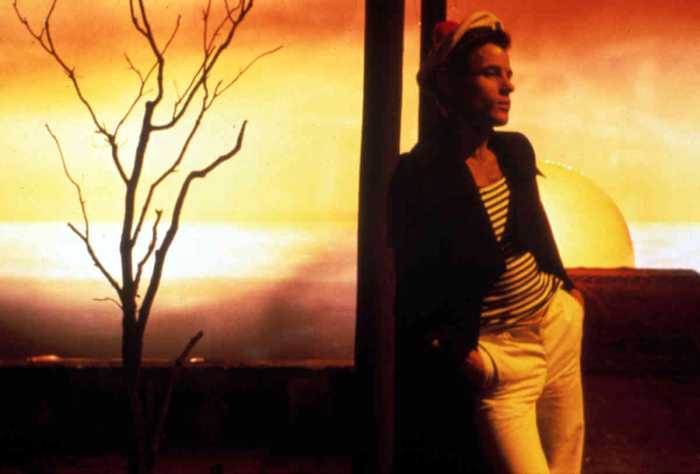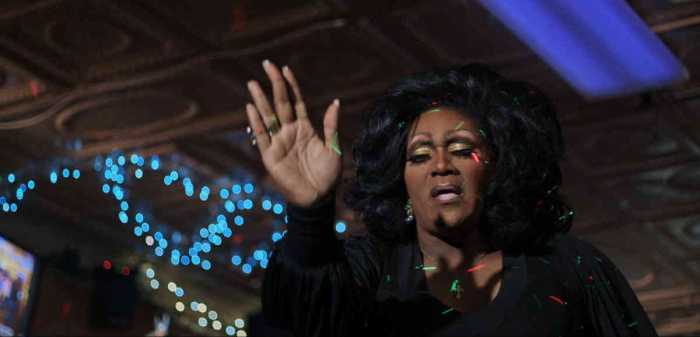Catherine Deneuve and Nino Castelnuovo Jacques Demy’s “The Umbrellas of Cherbourg.” | QUADCINEMA.COM
On April 3, the Quad Cinema had a splashy celebration marking its one year anniversary since its big remodelling. If you haven’t been to the venerable movie house, founded in 1972, you’re in for a pleasant surprise. It’s been gleamingly overhauled into a state of the art venue, with an affordable wine bar, the seating is no longer the narrow, tortured affair it was in the past, and it has brilliant repertory programming by C. Mason Wells and Gavin Smith. Recent retrospectives have included a blockbuster Barbra Streisand one last summer; a tribute to that great, undervalued actress, Geneviève Bujold, and one that just wrapped featuring the films of Alan Rudolph, who, like Frank Borzage, is a director deeply invested in romance among people who, at first blush, would seem to fall into the category of “loser.”
In attendance at the party were Al Pacino (who also had a retrospective), film veterans Jonas Mekas and Sheila Nevins, a passel of press reps and critics, like my buddy Time magazine’s Stephanie Zacharek, the best-dressed film critic ever, and David Edelstein, and Charles S. Cohen, the producer/ real estate honcho who bought the Quad in 2014 and seems intent on keeping communal film culture alive here.
IN THE NOH: Ode to the Quad, ladies’ season, puppet from Oz
With the recent loss of the Sunshine Cinema and — painfully — Lincoln Plaza Cinema, not to mention Film Forum closing for the summer for its own renovation, the Quad will provide a fit haven for Manhattan’s cinephiles, especially in light of the upcoming “French Melodrama” series, presented by the Cinematheque Francaise from May 16 to 22.
Familiar classics like Max Ophüls’ ravishing masterpiece “The Earrings of Madame De” (May 20, 4:50 p.m.; May 22, 9:05 p.m.) and Jacques Demy’s “The Umbrellas of Cherbourg” (May 17, 8:10 p.m.; May 20, 7 p.m.) will be screened, along with real rarities like Ophuls’ 1939 “Sans lendemain” (May 18, 7 p.m.; May 20, 1 p.m.), which, like his memorable “Letter from an Unknown Woman,” is exquisitely made, with a beautiful performance by the great Edwige Feuillère, as a topless cabaret dancer who pretends to be a great lady to deceive an old lover, that soap opera is transformed into art.
Fernand Gravet and Micheline Presle in Abel Gance’s “Paradise Lost.” | QUADCINEMA.COM
Another legendary French actress, luminous Micheline Presle, stars in Abel Gance’s 1940 “Paradise Lost” (May 16, 6:40 p.m.; May 19, 3 p.m.), playing both a mother who died during childbirth and her own daughter, who must deal with the inappropriately young girlfriend of her widowed father (talented Fernand Gravet), who is a successful dress designer. The period costumes are by fabled designer Barbara Karinska — Balanchine rarely made a move without her — who was recently honored with a film about her (by Suzy Benzinger) at this year’s dependably wonderful Irene Sharaff Awards for costume and set design, held at the Edison Ballroom on April 20.
Jean Grèmillon’s 1937 ”Geule d’Amour” (May 17, 6:15 p.m.; May 18, 5 p.m.) reunites the iconic stars of the classic “Pepe le Moko”: fatalistic, world-weary Jean Gabin and the dazzlingly chic Mireille Balin in a real old-school star vehicle that again posits him as a man, in the French Foreign Legion, utterly obsessed with her, to the ruination of his life.
What began as a rather haphazard theater season, with the weirdly shabby and sad “Prince of Broadway,” has finally morphed into something pretty special, mostly due to a bracingly strong female presence on the boards this year. Off the top, I can think of at least eight actresses who are currently giving performances that are each, in their way, spectacular. The big buzz was Glenda Jackson’s return in “Three Tall Women,” and, indeed, it was wonderful to see her again, her ferocious energy and daunting imperiousness gorgeously undiminished — and I’d forgotten how much I missed the uniquely authoritative sound of her voice (the best Elizabeth I, by far) — in Albee’s most personal and, I am beginning to think, best play. Inspired by his fraught relationship with his mother who was difficult, to put it mildly, with its scabrous honesty, riveting dialogue, and haunting moments of pure, poetical transcendence, it is nothing less than this playwright’s own “Long Day’s Journey into Night.” Backing her up with two fecund, incisive portrayals of their own are Laurie Metcalf — no surprise there — and Alison Pill, who did surprise me with a fierce elegance I never would have expected was in her. In the past, I always wondered why she was so the ingenue du jour, ubiquitously cast in all sorts of things and never bringing much beyond a smooth proficiency and dewy youth to the table. Perhaps being in the presence of such dynamic titanesses as Jackson and Metcalf forced her to up her game, and I now look forward to her future work after this definitive breakthrough.
A similar thing happened with “Saint Joan,” for I was originally not looking forward to it, although it’s a great play and I’d never seen it staged. After an indifferent Juliet and two “I can’t believe she got Tony-nominated for that” appearances — as a nosy maid, in “Stick Fly,” and as Nora’s daughter in that mystifyingly praised college skit entitled “A Doll’s House: Part 2” — I decided that Condola Rashad, who had been lovely in “Ruined,” was decidedly not the stuff that dreams are made of, let alone worthy of playing Juliet and Joan, two signal roles very few actresses ever get to play in a lifetime, save Katharine Cornell, once the unquestioned First Lady of the American stage.
Well, slap me for a presumptuous ass, because she made an absolutely splendid Maid of Orleans. All the necessary elements were there, obviously carefully prepared — the stirring voice with just enough of an accent, the agile movement (without leaning too heavily into the realm of butch), the uncanny sense of timing for that Shavian verbiage, and, essentially, the alluring yet fanatical passion that led her gloriously into battle and, subsequently, to her doom. And then, obviously, all that preparation was forgotten enough to enable her to have the fluidity and inner freedom to deliver the goods. And — boy! — did she ever.
The success of the two triumphant classic musical revivals which both recently opened, is largely due to the ladies. In “Carousel,” it’s all about Jessie Mueller, who is heartbreakingly right as poor, dumb Julie Jordan, and theatrical treasure Lindsay Mendez, so blazingly good and downright lovable as Carrie Pipperidge that you almost go, “Audra who?”
Like a lot of people, I wondered at director Bartlett Sher’s choice of Lauren Ambrose to play the coveted Eliza Doolittle in “My Fair Lady.” Why her, when there’s Laura Benanti, Kelli O’Hara, Laura Osnes, and others who would be no-question perfect casting? However, within minutes of her entrance, I succumbed to her quite brilliantly detailed and inventively gestural performance, and was pleasantly surprised by her lovely, fluent soprano voice. Hers is undoubtedly the best acted I’ve seen since Wendy Hiller in the 1938 film “Pygmalion.” Nice touches abound, like her physical clumsiness in the Ascot scene in her new, unaccustomed finery (in the movie musical, Audrey Hepburn had the rather unlikely, imperturbable poise of a supermodel).
I’m saving the very best for last: in the CSC production of Tennessee Williams’ “Summer and Smoke,” Marin Ireland as Alma Winemiller is giving one of the greatest performances I have ever seen. I was never a huge fan of this most fragile of the playwright’s work — that eternal conflict between the spirit and the flesh is a hackneyed theme that I wish had been retired after “Rain,” the Hispanic characters are odious stereotypes, and Alma just seems to have victim stamped on her forehead from Scene I and usually comes across as more tiresome than tragic.
Not in this production, at any rate, for Ireland’s miraculously gauged acting both transcends and transforms the material by virtue of her tenacious concentration, explosive energy, sudden seductive fire, and heartbreaking delicacy. Geraldine Page finally became a true star in the theater with this role, but, having seen the 1961 film of it, I judge Ireland’s the superior interpretation. Where Page brought a certain non-stop nagging neuroticism, as well as a helluva lot of ZaSu Pitts dither, Ireland manages to humanize the crazed old maid, on the deepest level: by giving her a profound inner-directedness. If she dithers at all, it’s always to make a point, and Williams’ long arias for her about the mostly petty little joys and sorrows in her horrendously sheltered, limited life are delivered with a desperate intensity, a slight but unseemly hysteria that is nothing short of electrifying. It’s the kind of performance that, while definitely bravura, is always in pure service to the text and makes an audience sit up and note, “What an actress!” You’d better believe it, and I want some deep-pocketed, discerning soul to give Ireland her own theater — like Eva Le Gallienne — so we can see what she would do with a Blanche DuBois, Hedda Gabler, Amanda Prynne, or Albee’s Martha.
Any one of the above-mentioned shows are eminently worth catching if you can, for they are a definite reminder of exactly why so many of us moved here: instances of real artistry in a now concrete jungle of mass mediocrity, chain stores, and technological alienation.
The title puppet in “Randy Writes a Novel,” at the Clurman through June 18. | CLURMAN THEATRE
There’s artistry, too, in puppetry, as evinced by the currently running show “Randy Writes a Novel,” at the Clurman Theatre. Randy is the puppet in question here, purple, with just a mouth and ping pong eyes, and definitely more for the adults than the kiddies with his often scatological humor, well-honed cynicism, and hysterical rants about myriad topics, from literary eminences, like Hemingway and Harper Lee, to Craigslist. He’s often quite hilarious, even while giving you more “a-ha” moments than La Winfrey ever dreamt of, and he’s the brainchild of Australian puppeteer Heath McIvor.
I will probably get into trouble for mentioning McIvor, for, like Lady Bunny, he prefers to be known solely by his public persona (or masquerade, depending upon how you look at it). He requested that our scheduled interview be conducted solely with Randy, and not him at all.
And that was how I found myself sitting in the front row of the Harold Clurman Theatre, barking questions and observations to McIvor, lying prone on the stage, holding the chattering Randy aloft. Actually, it was pretty cool to watch the brilliant dexterity with which he manipulated this garrulous little bundle of fabric to be so very expressive.
It was also kinda hot, too, for McIvor is a definite cutie in a lot of ways, and has a fetching treasure trail, exposed by his unconventional positioning for our chat.
It was a unique experience, with certain tinges of the Michael Redgrave episode in “Dead of Night,” as it was often difficult to tell whose answer I was recording, Randy’s or McIvor’s. But I found both exceedingly charming and felt a certain dismay when Randy suddenly announced that, after this New York gig, he is retiring, forever. As I always say to my marionette friends, for they, after all, are French, “Qui sais?”
LA CINEMATHEQUE FRANCAISE PRESENTS FRENCH MELODRAMA | Quad Cinema, 34 W. 13th St. May 16-22 | quadcinema.com
RANDY WRITES A NOVEL | Harold Clurman Theatre, 410 W. 42nd St. | Through Jun. 18: Tue.-Thu. at 7 p.m.; Fri.-Sat. at 8 p.m.; Sat. at 2 p.m.; Sun. at 3 p.m. | $81.25 at theatrerow.org/clurmannowplaying/ | One hr., 15 mins., no intermission


































